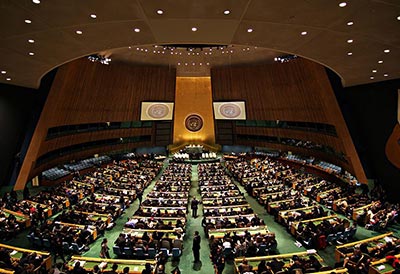Nigeria leads on removal of LGBT rights from historic UN agreement

UN General Assembly in New York City (Pic: Basil D Soufi)
A ground-breaking new UN agreement on global development goals has been stripped of language supporting the rights of LGBT people.
On Monday, UN Secretary-General Ban Ki-moon announced in New York that UN members had approved “The 2030 Agenda for Sustainable Development”.
He described the agreement, which has taken more than three years to conclude, as “a bold, ambitious and transformative sustainable development agenda for the next 15 years.”
“In many ways, these global goals represent a ‘to-do’ list for people and the planet,” he said.
LGBT people, however, have been left out of the sweeping and otherwise historic agreement, which replaces the previous Millennium Development Goals.
According to the conservative Christian-based Centre for Family and Human Rights (C-Fam), efforts to see the 30-page document be inclusive of LGBT people have been thwarted.
It reported that Brazil was among the governments that wanted “more progressive language” on human rights, including the rights of “LGBTI, whether or not these groups are fully stated.”
Brazilian Ambassador Guilherme de Aguiar Patriota complained twice about the exclusion of LGBT rights, as well as the changing of references to “gender” in the document to “sex”.
C-Fam’s Stefano Gennarini, J.D. wrote that, “In fact, the agreement was sanitised even further to exclude as much as possible terms that have been used by the UN bureaucracy to include LGBT rights.”
Ambassador Usman Sarki of Nigeria was singled out as demanding that the agreement be “cleaned” of references to LGBT equality.
The document also failed to take a stand on abortion, a major issue for global social policy, instead allowing governments to make their own decision on the matter.
The agreement will be formally adopted at the United Nations Summit in New York next month.
ILGA’s May 2015 report on state homophobia revealed that homosexuality remains illegal in 76 countries.
Eight nations officially allow for homosexuality to be punished with the death penalty, but only five (Mauritania, Sudan, Iran, Saudi Arabia and Yemen) actually implement it. Some provinces in Nigeria and Somalia as well as Isis-held areas also implement the death penalty.
Leave a Reply